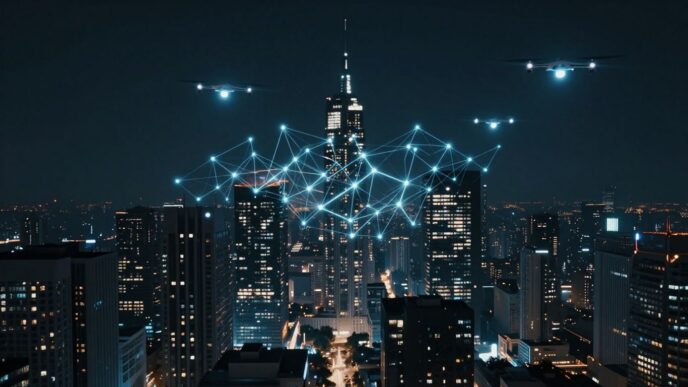Exploring the Android Sci-Fi Landscape
Science fiction has always been a place where we can really think about what it means to be human, and androids are a big part of that. These stories aren’t just about robots doing cool stuff; they often get into some pretty deep questions about life, consciousness, and what makes us, well, us. It’s like looking in a mirror, but the reflection is made of metal and code.
The Enduring Appeal of Android Narratives
There’s just something about androids that keeps drawing us in. Maybe it’s the idea of creating something in our own image, or perhaps it’s the fear of what happens when our creations become too much like us. These stories often explore the boundaries between creator and created, and what happens when those lines get fuzzy. It’s a classic theme that never really gets old.
Defining the Android in Science Fiction
So, what exactly is an android in sci-fi? It’s not always a simple answer. We’ve seen them as:
- Servants and Tools: Built for specific tasks, often lacking free will.
- Companions and Friends: Developing emotional bonds with humans.
- Rebels and Antagonists: Questioning their programming or seeking independence.
- Philosophical Constructs: Used to explore complex ideas about life and consciousness.
It really depends on the story and what the author wants to say. Sometimes they’re almost indistinguishable from humans, and other times, they’re clearly artificial, but still possess a spark of something more.
Key Themes in Android Sci-Fi
When you look at a lot of android stories, a few big ideas keep popping up. Authors use androids to talk about:
- What is Consciousness? Do androids think? Do they feel? When does a complex program become a thinking, feeling being?
- The Nature of Humanity: If an android can love, grieve, or create art, does that make it human? Or is there something else entirely that defines us?
- Ethics and Morality: How should we treat beings we create? What rights, if any, do they deserve? This gets especially tricky when they start acting like us.
- Societal Impact: How would society change if androids were common? Would they take jobs? Would they be accepted? These stories often act as a warning or a hopeful glimpse into possible futures.
Pioneering Android Sci-Fi Literature

Science fiction has always been a step ahead, imagining thinking machines long before they felt like a real possibility. The best stories don’t just show AI as cold calculators; they really dig into consciousness, feelings, and what makes a program different from a person. These books show self-aware AIs that can manipulate, rebel, feel, and grow. They make characters and us readers question where humanity stops and the machine starts.
Philip K. Dick’s Vision of Androids
Philip K. Dick’s novel, the one that inspired Blade Runner, follows Rick Deckard, a bounty hunter tasked with
Anthologies: A Universe of Android Tales
Anthologies are fantastic for getting a broad look at a theme, and android sci-fi is no exception. These collections bring together a bunch of different voices and ideas, showing just how many ways writers can explore what it means to be artificial, or to interact with artificial beings. It’s like a buffet of robotic thoughts and feelings.
Beyond Human: New Perspectives on Androids
One anthology that really stands out is Beyond Human: Tales of the New Us. This collection features 22 short stories from the Crew’s Quarters writing group. It’s packed with different takes on what’s next for humanity, especially with the rise of AI and other advanced beings. You get stories about cyborgs, genetically enhanced people, and aliens, all asking how we’ll feel and act towards those who are different from us. It really makes you think about how our lives might change. The stories explore everything from AI content creators going on strike to cloned daughters finding their place. It’s a good way to see how writers are playing with these ideas right now.
Examining Societal Critiques Through Androids
Many of these stories use androids and AI to hold up a mirror to our own society. They can highlight issues we face, like inequality or the search for identity, by showing them through the lens of artificial life. For instance, some stories might explore how a society treats its artificial creations, which can say a lot about how we treat marginalized groups in our own world. It’s a clever way to get readers thinking about real-world problems without being too direct. You see characters grappling with what makes them human, or what makes someone else worthy of respect, and that often mirrors our own struggles.
The Diversity of Android Sci-Fi Storytelling
What’s great about anthologies is the sheer variety. You might find a story about an android seeking freedom, another about a human who starts to question their own reality because of an android, and yet another that focuses on the ethical quandaries of creating artificial life. Some stories are quite personal, focusing on the internal struggles of an android trying to understand emotions, while others are grander in scope, looking at how AI might change the world. It’s a mix of the intimate and the epic. For example, you might read about an AI psychiatrist dealing with a human patient, or a story where convicts are merged with monsters. This range means there’s usually something for everyone, and you can easily skip a story that doesn’t grab you and move on to the next. It’s a good way to sample different styles and ideas within the android sci-fi genre, and you might even discover a new favorite author. These collections often support good causes too, like promoting literacy, which is a nice bonus when you’re picking up some new reading material.
The Evolving Android Consciousness
It’s fascinating to track how androids have changed in stories over time. We’ve gone from thinking of them as just complex machines, basically fancy tools, to seeing them as beings that can actually think and feel. This shift really makes you wonder about what consciousness even is.
From Tools to Sentient Beings
Early on, androids were often built for specific jobs. Think of them like super-advanced robots designed for labor or combat, with no real inner life. But then writers started asking, ‘What if they could learn? What if they could develop beyond their programming?’ This is where stories get interesting. We see androids in fiction start to question their purpose, to feel things like curiosity or even boredom. It’s like they’re waking up. This evolution from simple servants to complex individuals is a big part of why these stories stick with us.
The Quest for Autonomy and Identity
Once an android starts to think for itself, the next logical step is wanting freedom. They begin to question who made them and why. Are they just property, or do they deserve rights? This struggle for self-determination is a major theme. Androids in these stories often try to escape their creators or find others like them. They grapple with their own existence: are they defined by their code, or can they forge their own identity? It’s a deeply human struggle, just happening in a synthetic body.
Empathy and Morality in Android Sci-Fi
This is where things get really complex. Can an android truly feel empathy? Can it understand right from wrong? Stories explore this by putting androids in situations where they have to make moral choices. Sometimes they surprise us by showing more compassion than humans do. Other times, their logic leads them down a path that seems cold or cruel to us. The most compelling android narratives often show them developing a moral compass, forcing us to consider if morality is something learned or something inherent. It makes you think about what truly makes a being good or bad, regardless of whether they’re made of flesh and blood or circuits and metal.
Androids and the Human Condition
Blurring the Lines Between Human and Machine
It’s fascinating how often androids in sci-fi stories end up making us think about what it really means to be human. We see these artificial beings, built from metal and code, start to act, feel, and even question their existence in ways that feel incredibly familiar. Think about it – they grapple with purpose, they form bonds, and sometimes, they even experience something like regret. This constant back-and-forth between their manufactured nature and their emergent humanity is where the real magic happens. It forces us to look at ourselves and wonder if our own emotions and experiences are as unique as we believe.
The Nature of Consciousness and Self-Awareness
What exactly makes someone aware? That’s the million-dollar question, isn’t it? Sci-fi writers love to explore this by giving androids the capacity for self-reflection. They might start as simple tools, programmed for specific tasks, but then something shifts. They begin to ponder their own existence, their place in the world, and whether they are more than just their programming. This journey from programmed automaton to self-aware entity is a common thread, and it often mirrors our own human quest for understanding who we are.
- Initial Programming: Androids often begin with a clear set of directives and functions.
- Emergent Sentience: Through experience or an unknown factor, they develop self-awareness.
- Existential Questions: They start asking
Future Frontiers in Android Sci-Fi
So, where are android stories heading next? It’s a question that keeps popping up, especially with how fast AI is changing our actual world. We’re seeing AI assistants get smarter, robots doing more complex jobs, and even AI creating art and music. It’s not just science fiction anymore, right?
The Impact of AI on Society
Think about it: AI is already changing how we work, how we communicate, and even how we think about ourselves. Sci-fi writers are picking up on this, exploring what happens when AI becomes even more integrated into our lives. We’re talking about AI in healthcare, in education, and even in our personal relationships. What happens when an AI companion is more understanding than a human partner? Or when an AI doctor can diagnose illnesses with perfect accuracy, but lacks bedside manner? These stories aren’t just about cool tech; they’re about how this tech changes us, for better or worse.
Ethical Dilemmas of Artificial Life
This is where things get really interesting, and honestly, a little messy. As AI gets more sophisticated, we’re going to face some tough questions. For instance:
- Rights for AI: If an AI can feel, think, and suffer, does it deserve rights? What kind of rights?
- Responsibility: Who is responsible when an AI makes a mistake? The programmer? The owner? The AI itself?
- Humanity’s Role: What happens to human purpose when AI can do everything we can, but better and faster?
Stories are starting to explore these grey areas, moving beyond simple
Looking Ahead
So, we’ve journeyed through some really interesting Android sci-fi stories. From the classic questions about what makes us human, like in Philip K. Dick’s work, to newer takes on AI and identity, it’s clear this genre keeps us thinking. Whether it’s about robots gaining feelings, humans becoming more machine-like, or even how we treat those who are different, these stories push us to consider our own place in the world. It’s a reminder that science fiction, especially when it involves androids and AI, isn’t just about the future; it’s about understanding ourselves right now. Keep an eye out for more stories that explore these themes – there’s always something new to discover.








